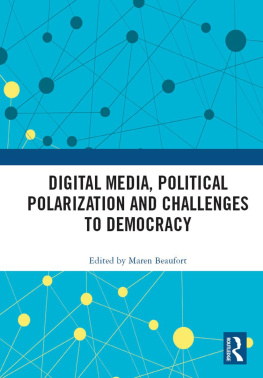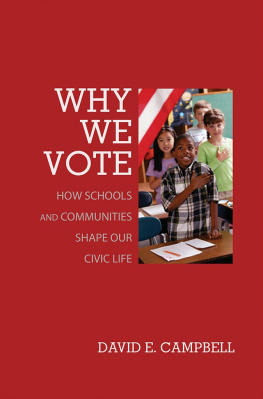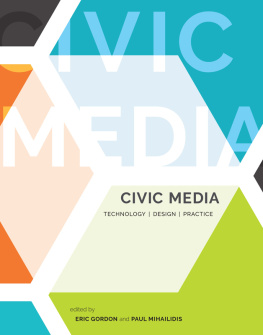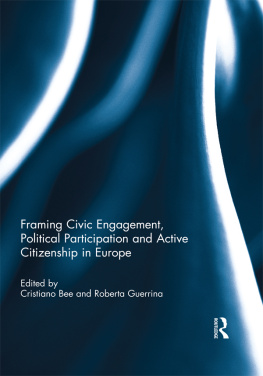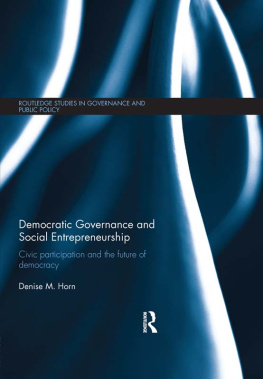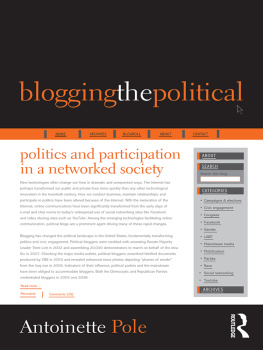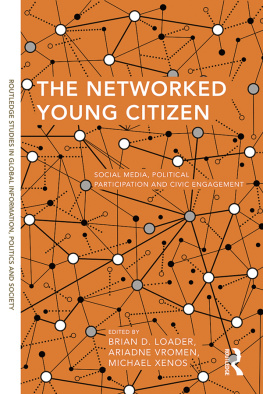
Communicative Civic-ness
Communicative Civic-ness explores how political culture shapes social media interactions in civic participation, arguing that social media usage is informed by context-specific civic and political culture.
Drawing on cutting-edge research, the book develops a new robust theoretical and conceptual framework on civic engagement and participation, comprising:
contextual ethos of civic communication;
political culture and civic communication;
use of social media in private and public spheres;
design of social media.
It critically addresses issues within the concept of political culture and develops the concept of communicative civic-ness. This concept seeks to aid a better-informed debate about the capacity of social media to support the pluralistic discussions that underpin deliberative democratic processes.
This book appeals to both undergraduate and postgraduate students, as well as academics with an interest in areas including (but not limited to) sociology, political science and media studies. It will also provide useful information and understanding to third sector organisations and policy-makers regarding forms of civic participation.
Bridgette Wessels is Professor of Sociology and Social Inequalities at the University of Glasgow, UK. Her research focuses on the development and use of digital technology and services in social and cultural life. This includes digital services and communication in the public sphere, everyday life and civic life, social and digital inequalities, as well as specific areas such as telehealth, mobile communication and privacy in digital communication.
First published 2018
by Routledge
2 Park Square, Milton Park, Abingdon, Oxon OX14 4RN
and by Routledge
711 Third Avenue, New York, NY 10017
Routledge is an imprint of the Taylor & Francis Group, an informa business
2018 Bridgette Wessels
The right of Bridgette Wessels to be identified as author of this work has been asserted in accordance with sections 77 and 78 of the Copyright, Designs and Patents Act 1988.
All rights reserved. No part of this book may be reprinted or reproduced or utilised in any form or by any electronic, mechanical, or other means, now known or hereafter invented, including photocopying and recording, or in any information storage or retrieval system, without permission in writing from the publishers.
Trademark notice: Product or corporate names may be trademarks or registered trademarks, and are used only for identification and explanation without intent to infringe.
British Library Cataloguing in Publication Data
A catalogue record for this book is available from the British Library
Library of Congress Cataloging in Publication Data
Names: Wessels, Bridgette, author.
Title: Communicative civic-ness : social media and political culture / Bridgette Anne Wessels-Pidd.
Description: 1 Edition. | New York : Routledge, 2018.
Identifiers: LCCN 2017047510| ISBN 9781138959378 (hardcover) | ISBN 9781138959408 (pbk.) | ISBN 9781315660653 (e-book)
Subjects: LCSH: Social media--Political aspects. | Political culture. | Social parrticipation.
Classification: LCC HM742 .W47 2018 | DDC 302.23/1--dc23
LC record available at https://lccn.loc.gov/2017047510
ISBN: 978-1-138-95937-8 (hbk)
ISBN: 978-1-138-95940-8 (pbk)
ISBN: 978-1-315-66065-3 (ebk)
For Michael
I have been extremely lucky to experience much support whilst writing this book. In the first instance, I would like to thank Gerhard Boomgaarden of Routledge for commissioning the book. I would like to thank the Media and Journalism Department at Linnaeus University (Sweden) for providing the intellectual support in writing this book by funding my Visiting Professorship there. I would like to thank Michael Pidd for working with my rough sketches in and turning them into clear figures. Thanks to Helen Rana for her help in commenting on and proofreading the manuscript. I appreciated the comments of the reviewers because they helped to put the finishing touches to the book.
This book examines how social media features in established and emerging forms of civic engagement and participation in contemporary Western democratic societies within a globalising world. Ever since Athenian democracy in the 5th century BC, questions have been asked about how people engage and participate in civic and political life. This question, alongside debates about democracy, highlights that there is a range of different ways that people can engage with, and participate in, democratic life. There is a longstanding concern about the level and quality of engagement and participation and the ways that engagement and participation can be organised, and the characteristics of that concern have changed over historical time. In the current digital and networked society, there is a perceived crisis in, and fragmentation of, political culture. The transition from an industrial society to a digital networked society means that many forms of civic engagement from the industrial period no longer seem relevant. The rise of digital communication in the context of a globalised economy and an information society has generated various senses of civic life and different ways of connecting with others. Furthermore, the neo-liberal agenda has led to a weaker, less-centralised and directive role for government, which has resulted in people believing that government no longer represents them either their own personal troubles or wider public issues. This raises questions about where and how such issues can be expressed, discussed and acted upon. A sense of civic culture is relevant within those spaces and instances, because it offers the possibility of people interacting and acting together in terms of values, affinities, knowledge, practices, identities and debates, which may (or may not) lead to various types of action being taken to address these issues.
As John Dewey (1939a) famously wrote, society is made in and through communication, a point that is referred to throughout the book. This book develops this notion, arguing that civic engagement and participation are also made in and through communication. The extensive use of social media by individuals and organisations today is creating ways for people to identify a range of relevant issues, share these across networks and find ways to mobilise action around their concerns. Given the current situation of a weakened role of government, political and social inequalities and the rise of issue politics, new types of social networks are emerging which seek to address a range of civic concerns at local, national and global levels. In this context, a communication medium that is interactive, networked and social enables people to engage in various ways and participate in shaping the instances of communication and any related social action. These requirements are fulfilled by social media. In overall terms, social media facilitate the creation and sharing of information, ideas and other forms of expression through digitally supported networks. There are a number of different social media platforms with a range of features; however, generally speaking, social media are interactive Web 2.0 Internet-based communication applications which entail users generating content and service-specific profiles, and which facilitate online social networks. Social media are used for personal, civic and commercial purposes and have been taken up and used in a variety of contexts of civic communication and action. This book explores the civic contexts in which social media have been used, in order to assess the way that social media are enabling citizens and civil society at individual and group levels to engage in both civic participation and democratic processes.


